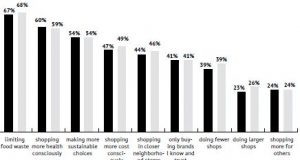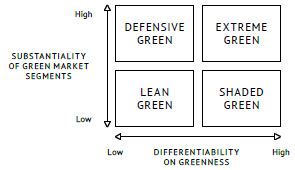Sustainability products became a “new normal” for the nowadays society. Different aspects of government, economical and socio-cultural issues affect the sustainability certificate perception by final consumers. The aim of this paper is to consider findings from marketing research and analyze the outputs. The survey monitored green behavior by the Czech consumers in time. The reason and motivation of this analysis was the academic interest in Czech buying behavior modification, caused by pandemic COVID-19. Sustainability products contribute different specifics related to the way of production, processing, and selling. All mentioned aspects reflect the final consumer buying decision which can fluctuate under the worldwide and local impacts.
Introduction
Consumer preferences and orientation have been impacting by different circumstances over the years. A great variety of economic and worldwide bellwethers influenced daily habits and foundations. Nowadays consumers have become more briefed and formed about sustainability, eco-standards, and recyclable products (MacKenzie et al. 2020). Among different generations increases the interest in sustainable products which can positively impact the environment and maintain companies’ “eco – friendly” orientation. Findings from certain researches (MacKenzie et al. 2020; Arboretti and Bordignon 2016) represent the diversity of sustainable products within different consumer groups. Each target demonstrates specific needs and objectives for sustainable product consumption.
In accordance with (Golden et al. 2010), the consumer choice towards green, sustainable products should not be only affected by one parameter – price. The sustainable certificates should perform and establish trust in eco-friendly products. This, consumers, will be informed about sustainability advantages and relevance. In research of (Pirani and Secondi 2011), the most environmentally responsible citizens were Swedish (99.6%), Greek (99.3%), and Cypriots (99.2%). Stated numbers demonstrate the percentage of respondents, who favored the importance of environment protection activities. From mentioned above, the consumer buying choice towards sustainability can be deduced. Hence, customer environment protection and social responsibility tendency can evolve and fluctuate under certain circumstances.
Theoretical background
The worldwide circumstances and changes affect customer’s daily lives and preferences. Moreover, during the last years, different economic indicators were changed or modified by the COVID-19 pandemic (Teresiene et al. 2020). The pandemic situation has brought specifics on current retailers among worldwide economics. Findings from various surveys and studies (Accenture 2020) reflect the impact on consumer’s way of thinking. A needs analysis was also reflected, as one of the most important pillars for companies’ plans. As has been stated within the Accenture research (Accenture 2020), the population changed its daily habits, including buying behavior and preferences under the impact of regulations, oriented on minimizing COVID-19 extension. The research demonstrates a free main foundation and long-term trend which will be maintained within the future. Those three pillars are closely linked to sustainable products. As described by Accenture, a rise in the conscious consumption pillar is mainly aimed at consumers buying mindful. Under the changes and buying limitations, consumers’ unplanned and spontaneous buying behavior was modified into finding more sustainable options and self-controlling (Accenture 2020; Badgaiyan et al. 2016). The research conducted at the beginning of the pandemic illustrates consumer expectations which have been changed subsequently, under certain government restrictions. One of the main outputs from the research is the permanence of the pillar “only buying brands I know and trust”. Despite the restrictions and other issues caused by the pandemic COVID-19, the consumers still would like to purchase products that they trust and bought before the current worldwide situation. Nowadays customers are evaluating not just the edibility and type of product. Hence one of the major factors is labeling and sustainability certification of goods which can provide a complete description and justify consumers’ confidence and trust (Rupprecht et al. 2020).

Graph 1: Consumers´ confidence and trust
Source: Accenture (2020)
In the meantime, nowadays industries and companies are exploring opportunities to solve environmental issues and refocus on the Customer Social Responsibility standards (Lee 2021). Each organization has a different interest and goal by implementing sustainable concepts within the production, sales, and other business chains. In terms to become more stable and competitive, current businesses are facing the necessity of implementing sustainability and environment orientation concepts. All those conditions have to increase the efficiency and maximize the company value (Porter 2008). The green marketing strategy should be the main objective before the beginning of remodeling the organization into a green company with sustainable products. In accordance with Ginsberg and Bloom, each organization should mainly focus on two fundamentals. The first one incorporates the substantiality of the consumer segment for the organization. This measure allows to identify the right segment and implement the next steps based on consumer specifics. The second pillar is the differentiability of the business which can indicate potential issues and possibilities for future “green development” and environmental activities (Ginsberg and Bloom 2004).

Graph 2: Sustainable concepts
Source: Ginsberg and Bloom (2004)
Hence, current companies’ orientation is geared towards environmental measures and sustainability products. Those outlines and ideas became a “new normal” for nowadays customers. Nevertheless, a great variety of sustainable certifications can be also explored in terms to inject their main characteristics, advantages, and importance, not only for businesses but mainly for the final consumer. The main aim of all certificate is to assist the consumer to make the right, environmentally friendly buying action (Golden et al. 2010). According to (Jaderná et al. 2019) the interest in certified products has a great difference among the variety of target groups with certain needs and consumer specifics. Thus, proving that needs analysis and company green strategy orientation should be accurately prepared before the subsequent launch of activities. Sustainable certificates include a great variety of different labels, oriented on specific environmental and social aspects. In conformity with (Golden et al. 2010) current sustainable certificates and ecolabels get their recognition by fulfilling defined environmental requirements and conditions. All those criteria differ according to certain sustainability certifications. The certification of products or services is a process that incorporates different activities directed towards the product (services) recognition and characteristics identifying.
Studies and surveys which have been held by (Jaderná et al. 2019) and (Grunert et al. 2014) demonstrate the dependence of sustainable certificate on different economical and sociocultural factors. Research proves the variety of parameters that affect the consumer perception, knowledge about sustainable products, and certifications. Main factors have been established based on respondents’ gender, age, education, and the land of abode. All mentioned aspects bring knowledge and awareness about sustainable certificates.
Methodology
This paper aims to consider findings in 2019 to results of a new marketing research, organized in the second half of 2020. First, data from survey 2019 were interpreted in previous paper (Jaderná et al. 2019). The survey 2019 was conducted via the internet at the beginning of June 2018 through Trendaro, which is an application operated by a professional survey company called Behavio Labs, s. r. o. A total of 1,000 respondents were chosen so that a representative sample of the Czech population was obtained. Next, findings from survey 2020 are interpreted in this paper. It presents results of marketing research, designed when working on the grant SGS/2019/01 Jaderná at the Department of Marketing and Management at SKODA AUTO University. The survey was organized in cooperation with the research company Behavio Labs in 2020. 997 usable questionnaires from Czech consumers were adapted. After collecting data phase, the information was transferred to Microsoft Excel for transcoding into statistically measurable quantities. This file was then statistically evaluated in IBM SPSS Statistics. Data interpretation was done by frequency analysis to compare relative frequencies to data from survey 2019. Then the crosstabs analysis confirms/rejects expected dependences, based on data 2019. Pearson’s chi-squared test of good agreement was used to detect basic relationships and connections, at the level of descriptive statistics, using contingency tables. Only relationships between variables with p-value of the chi-square (Asymp.sig) less than 0.05 were further monitored. If a value lower than 0.05 is reached between two variables, it can be said that there exists a certain relationship between them. Adjusted residuals were interpreted. An adjusted residual that is more than 2 indicates that the number of cases in that cell is significantly larger. After the statistical processes, the results were compared with the results from survey 2019.
Preferences of certified products by the segment of Czech green consumers
Researchers have monitored green behavior of Czech consumers in time. They have been interested in many aspects, including purchasing of certified products. Results from the previous phase of marketing research were presented in 2019 (Jaderná et al. 2019). These results have been compared to new findings in 2020. The interest in the comparison between 2019 and 2020 was motivated due to transformation of society, because of COVID-19 pandemic. More consumers prefer Czech original products, or sustainable products. Sustainable products are remarkable by certificates. The same certificates of products and their purchases by Czech consumers were monitored in 2019, and 2020, namely:

Picture 1: Logos of certificates
Source: google.com (2020)
Most bought products in 2019 were products with label BIO (19 %), Fairtrade (17 %), and energy star (14 %). New findings from research 2020 are interpreted by Table 1. BIO products bought 24 % of respondents, Fairtrade 17 %, Rainforest 12 %, and energy star 12 %.
| Which certified products do you buy? | Relative frequency |
|---|---|
| Ecolabel | 6% |
| FSC | 8% |
| Energy star | 12% |
| Rainforest | 12% |
| Fairtrade | 17% |
| BIO | 24% |
Table 1: Purchasing of certified products
Source: Authors
A dependence of certified products´ purchasing on gender was in view in 2019, and 2020. A significant difference in answers between men and women for three certifications, specifically bio and Fairtrade products were bought more often by women than men, was confirmed in 2019. On the other side, energy star products were bought significantly more by men than women.
Following Table 2 shows relative frequencies of certified products´ purchasing by men, and women. The most bought products are BIO (28%), and Fairtrade (21%) by women. BIO is bought by men in 19%, and energy star in 15%.
| Do you buy some of certified products? | Men | Women |
|---|---|---|
| Ecolabel | 5% | 6% |
| FSC | 7% | 9% |
| Energy star | 15% | 9% |
| Rainforest | 11% | 13% |
| Fairtrade | 13% | 21% |
| BIO | 19% | 28% |
Table 2: Purchasing of certified products by men, and women
Source: Authors
The dependence of purchasing on gender was confirmed as significant, using statistical test – Chí-square test. Table 3 shows adjusted residuals. The number above 2 confirms the dependence. Findings are identical to previous findings in 2019. A significant dependence is confirmed by BIO and Fairtrade products bought by women, and energy star products by men.
| Gender | |||
|---|---|---|---|
| men | women | ||
| Ecolabel | Count | 23 | 32 |
| Adjusted Residual | -1 | 1 | |
| FSC | Count | 34 | 45 |
| Adjusted Residual | -1 | 1 | |
| Energy star | Count | 74 | 48 |
| Adjusted Residual | 2.8 | -2.8 | |
| Rainforest | Count | 56 | 67 |
| Adjusted Residual | -0.7 | 0.7 | |
| Fairtrade | Count | 65 | 108 |
| Adjusted Residual | -3.2 | 3.2 | |
| BIO | Count | 93 | 142 |
| Adjusted Residual | -3.2 | 3.2 |
Table 3: Dependence of certified products´ purchasing on gender
Source: Authors
Attention was payed to dependence of certified products´ purchasing on education level, too. BIO products were purchasing mostly by consumers with university degree (25%). The same education level is confirmed by Fairtrade (28%), rainforest (15%), FSC (10%), and ecolabel (7%), too. Energy star products are bought by consumers with graduation (15%). But, the second place is for university degree (14%).
The situation is very similar in 2020. Results of marketing research confirm the highest level educated consumers are mostly interested in buying certified products. Table 4 shows a percentage of respondents, purchasing products with ecolabel (7%), FSC (12%), energy star (16%), rainforest (18%), Fairtrade (29%), and BIO (31%).
| Do you buy some of certified products? | primary | no grad. | with grad. | university |
|---|---|---|---|---|
| Ecolabel | 4% | 6% | 4% | 7% |
| FSC | 4% | 5% | 9% | 12% |
| Energy star | 4% | 9% | 14% | 16% |
| Rainforest | 12% | 8% | 13% | 18% |
| Fairtrade | 8% | 8% | 20% | 29% |
| BIO | 17% | 15% | 27% | 31% |
Table 4: Purchasing of certified products by consumers of different education level
Source: Authors
A significant difference was confirmed in the answers of respondents for all certifications with only the exception of energy star, in 2019. The only exception is eco label in 2020. Adjusted residuals confirm the dependence of certified products´ purchasing on education level (above 2), instead of eco label certificate. But, relative frequency of answers shows, most respondents with university education buy ecolabel products.
| Education | |||||
|---|---|---|---|---|---|
| primary | no grad. | with grad. | university | ||
| Ecolabel | Count | 2 | 18 | 13 | 18 |
| Adjusted Residual | -0.5 | 0 | -0.2 | 1.5 | |
| FSC | Count | 2 | 15 | 17 | 29 |
| Adjusted Residual | -1.1 | -2.7 | -0.7 | 2.7 | |
| Energy star | Count | 2 | 28 | 29 | 39 |
| Adjusted Residual | -1.9 | -2.4 | -0.2 | 2.1 | |
| Rainforest | Count | 6 | 25 | 34 | 44 |
| Adjusted Residual | -0.1 | -3.1 | 0.8 | 3.2 | |
| Fairtrade | Count | 4 | 25 | 43 | 69 |
| Adjusted Residual | -1.8 | -5.6 | 0.1 | 5.3 | |
| BIO | Count | 9 | 49 | 61 | 75 |
| Adjusted Residual | -1 | -4.4 | 0.6 | 3.1 |
Table 5: Dependence of certified products´ purchasing on education level
Source: Authors
The last assessed dependence is on age of respondents. Table 6 offers view on relative frequencies by different age categories – answers in 2020. A big difference is visible by certificate FSC. 15% of respondents born 1996-2001 buy products with this certificate. Old people only in 2%. Very similar situation is by rainforest products – 21% of respondents in an age of 18-24 vs. 3% of respondents born 1928-1949.
| Do you buy some of certified products? | 1996-2001 | 1976-1995 | 1964-1975 | 1950-1963 | 1928-1949 |
|---|---|---|---|---|---|
| Ecolabel | 7% | 7% | 6% | 7% | 3% |
| FSC | 15% | 10% | 9% | 7% | 3% |
| Energy star | 9% | 15% | 14% | 13% | 10% |
| Rainforest | 21% | 19% | 14% | 10% | 3% |
| Fairtrade | 29% | 25% | 16% | 14% | 10% |
| BIO | 20% | 31% | 27% | 20% | 17% |
Table 6: Purchasing of certified products by consumers of different age categories
Source: Authors
A significant difference was confirmed in the answers of respondents for three certifications, namely Fairtrade, rainforest and fsc, in 2019. For the three certificates, the two oldest age generations have the lowest percentages of purchasing certified products. On the other hand, the percentage is always the highest for people born between 1976 and 1995.
In 2020, the most significant difference was confirmed by all certificates, instead of energy star and ecolabel. The youngest two generations tend to buy products with certificates FSC, rainforest, Fairtrade and BIO.
| Age category | ||||||
|---|---|---|---|---|---|---|
| 1996-2001 | 1976-1995 | 1964-1975 | 1950-1963 | 1928-1949 | ||
| Ecolabel | Count | 7 | 28 | 15 | 5 | 0 |
| Adjusted Residual | 1.1 | 1.1 | 0.4 | -1.9 | -1.5 | |
| FSC | Count | 15 | 40 | 17 | 6 | 0 |
| Adjusted Residual | 3.4 | 1.3 | -0.8 | -2.6 | -1.8 | |
| Energy star | Count | 9 | 61 | 33 | 14 | 4 |
| Adjusted Residual | -0.5 | 1.5 | 0.5 | -2.2 | -0.2 | |
| Rainforest | Count | 16 | 74 | 25 | 5 | 2 |
| Adjusted Residual | 1.8 | 3.9 | -1.3 | -4.4 | -1.3 | |
| Fairtrade | Count | 28 | 86 | 37 | 19 | 3 |
| Adjusted Residual | 3.9 | 1.7 | -1.3 | -2.8 | -1.5 | |
| BIO | Count | 17 | 121 | 55 | 32 | 9 |
| Adjusted Residual | -0.9 | 2.7 | -0.7 | -2.3 | 0.2 |
Table 7: Dependence of certified products´ purchasing on age category
Source: Authors
Conclusions
Preferences of consumers transform constantly, and marketers should monitor changes, often caused by negligible aspects. Pandemic of COVID-19 affects many attributes of consumers´ behavior. A society transforms, hierarchy of values is variable much more than never before in our lives. Therefore, researchers wanted to know changes in consumers´ buying behavior, in connection to monitored aspects – purchasing of certified products. Results from survey 2019, interpreted in previous paper (Jaderná et al. 2019), were considered to new findings from survey 2020. Researches expected changes in preferences of buying certified products. But, changes were very low. The most bought certified products in 2019 were products with certificate BIO (19%), Fairtrade (17%), and energy star (14%). 32% of respondents bought BIO products in 2020. It is possible to see one of the most significant difference from data 2019. But, Fairtrade is similar – 23%, and energy star too (16%). Newly the 3rd place is for Rainforest by 17%.
Considerable changes are not seen in the context of dependence on gender, education level, or age category. Findings, concerned on dependence of buying certified products on gender, are identical to previous findings in 2019. A significant dependence is confirmed by BIO and Fairtrade products bought by women, and energy star products by men.
Education level influence the buying certified products very similar, too. A significant difference was confirmed in the answers of respondents for all certifications, except energy star in 2019, and eco label in 2020.
A significant dependence on age category was confirmed by two oldest age generations in the answers of respondents for three certifications, namely Fairtrade, rainforest and FSC, in 2019.
In 2020, the most significant difference was confirmed by all certificates, instead of energy star and ecolabel. The youngest two generations tend to buy products with certificates FSC, rainforest, Fairtrade and BIO. Values of relative frequency were very similar.
It is possible to reject the premise, consumers´ behavior, connected to certified products, have changed in pandemic situation. But, the difference is the more visible, the more time running.
Poznámky/Notes
This paper is one of the outcomes of the grant research SGS/2019/01 Jaderná at the Department of Marketing and Management at SKODA AUTO University.
Literatúra/List of References
- Accenture, 2020. COVID-19: How consumer behavior will be changed. 2020. [online]. [cit. 2021-4-06]. Available at: <https://www.accenture.com/us-en/insights/consumer-goods-services/coronavirus-consumer-behavior-research>
- Badgaiyan, J. A. et al., 2016. Impulsive buying tendency: Measuring important relationships with a new perspective and an indigenous scale. 2016. [online]. [cit. 2021-4-06]. Available at: <https://www.sciencedirect.com/science/article/pii/S097038961630057X>
- Arboretti, R. and Bordignon, P., 2016. Consumer preferences in food packaging: CUB models and conjoint analysis. 2016. [online]. [cit. 2021-4-06]. Available at: <https://www.emerald.com/insight/content/doi/10.1108/BFJ-04-2015-0146/full/html>
- Ginsberg, M. J. and Bloom, N. P., 2004. Choosing the Right Green Marketing Strategy. 2004. [online]. [cit. 2021-4-06]. Available at: <https://sloanreview.mit.edu/article/choosing-the-right-greenmarketing-strategy/>
- Golden, J. et al., 2010. An Overview of Ecolabels and Sustainability Certifications in the Global Marketplace. 2010. [online]. [cit. 2021-4-06]. Available at: <https://www.academia.edu/20586265/An_Overview_of_Ecolabels_and_Sustainability_Certifications_in_the_Global_Marketplace>
- Grunert, G. K. et al., 2014. Sustainability labels on food products: Consumer motivation, understanding and use. 2014. [online]. [cit. 2021-4-06]. Available at: <https://www.sciencedirect.com/science/article/pii/S0306919213001796>
- Jaderná, E. et al., 2019. The interest of different generations of Czech consumers in certified products and environmental organizations. In: Marketing Science & Inspirations. 2019, 14(4), 10-24. ISSN 1338-7944. [online]. [cit. 2021-4-06]. Available at: <https://msijournal.com/the-interest-of-different-generations-of-czech-consumers-in-certified-products-and-environmental-organizations/>
- Lee, H. S., 2021. Effects of retailers’ corporate social responsibility on retailer equity and consumer usage intention. 2021. [online]. [cit. 2021-4-06]. Available at: <https://www.researchgate.net/publication/350010215_Effects_of_Retailers’_Corporate_Social_Responsibility_on_Retailer_Equity_and_Consumer_Usage_Intention>
- MacKenzie, B. G. et al., 2020. Consumer preferences for eco-friendly attributes in disposable dinnerware. 2020. [online]. [cit. 2021-4-06]. Available at: <https://www.sciencedirect.com/science/article/pii/S0921344920302834>
- Pirani, E. and Secondi, L., 2011. Eco-friendly attitudes: What European citizens say and what they do. 2011. [online]. [cit. 2021-4-06]. Available at: <https://www.researchgate.net/publication/262373842_Eco-Friendly_Attitudes_What_European_Citizens_Say_and_What_They_Do>
- Porter, M. E., 2008. Competitive advantage of nations: Creating and sustaining superior performance. New York: Free Press, 2008. ISBN 9781416595847.
- Rupprecht, D. D. Ch. et al., 2020. Trust me? Consumer trust in expert information on food product labels. 2020. [online]. [cit. 2021-4-06]. Available at: <https://www.sciencedirect.com/science/article/pii/S0278691520300582>
- Teresiene, D. et al., 2020. The impact of covid-19 on european financial markets and economicsentiment. 2020. [online]. [cit. 2021-4-06]. Available at: <https://www.scientific-publications.net/get/1000043/1600092775219147.pdf>
Kľúčové slová/Key words
sustainability, consumer, product, certification, environmental, pandemic
udržitelnost, spotřebitel, produkt, certifikace, environmentální, pandemie
JEL klasifikácia/JEL Classification
L62, M11, M31
Résumé
Preference nákupu certifikovaných výrobků vlivem COVID-19
Vnímání udržitelných certifikátů konečnými spotřebiteli jsou ovlivněné nejrůznějšími vnějšími podmínkami, jako jsou různé vládní aspekty, ekonomika státu a sociokulturní prostředí. Cílem této práce je posoudit poznatky z marketingového výzkumu a analyzovat jednotlivé výstupy. Hlavním důvodem a motivací této analýzy byla zainteresovanost vlivu pandemií COVID-19 na chování českých spotřebitelů. Byly sledovány stejné aspekty chování českých spotřebitelů v roce 2019 a 2020. Nákup produktů s certifikáty byl posouzen mj. i z pohledu sociodemografických údajů – pohlaví, vzdělání a věk. Z analýzy je patrné, že se postoje českých spotřebitelů příliš nezměnily vlivem pandemie COVID-19.
Recenzované/Reviewed
30. March 2021 / 31. March 2021













